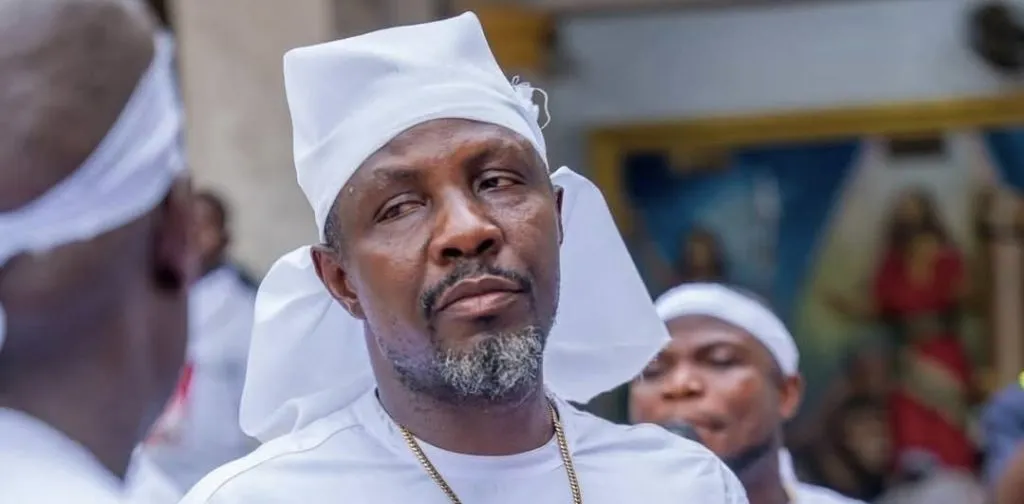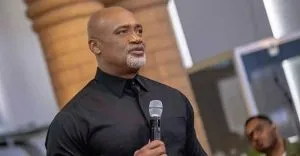Who is Tompolo? Here is What You Need to Know About Him

Government Oweizide Ekpemupolo, better known as Tompolo, is a polarizing figure whose life mirrors the turbulent socio-political landscape of Nigeria’s oil-rich Niger Delta. Born on April 12, 1971, into the Okerenkoko royal family in Gbaramatu Kingdom, Warri South, Delta State, Tompolo has worn many hats: militant commander, religious leader, fugitive, and, most recently, a powerful security contractor. His journey from armed rebellion to government ally encapsulates the complexities of resource control, ethnic tensions, and governance in one of Africa’s most volatile regions. This article delves into Tompolo’s life, his rise to prominence, his controversies, and his enduring influence in the Niger Delta.
Early Life and Roots in the Niger Delta
Tompolo was born the only son among seven children to Chief Thomas Osen Ekpemupolo and Mrs. Solongha Ekpemupolo in the Ijaw-dominated Gbaramatu Kingdom. His nickname, “Tompolo,” is a blend of his father’s name—Tom from Thomas and Polo from Ekpemupolo. Raised in a region plagued by environmental degradation and economic marginalization due to oil exploration, Tompolo’s early years were shaped by the stark contrast between the Niger Delta’s resource wealth and its impoverished communities.
He attended Okepopo Primary School in Warri and later National Comprehensive College, Warri, where he earned his Senior Secondary Certificate. In 1993, Tompolo briefly enrolled in college but dropped out to work as a manager for his father’s oil-servicing company, Tompolo Nigeria Limited. This early exposure to the oil industry laid the groundwork for his later activism, as he witnessed firsthand the exploitation of the Niger Delta’s resources by multinational corporations and the Nigerian state.
The Making of a Militant Leader
The 1990s marked a turning point for Tompolo as ethnic tensions between the Ijaw and Itsekiri communities, coupled with grievances over resource control, fueled unrest in the Niger Delta. In 1993, he joined a local resistance group, driven by the belief that the Nigerian government and oil companies were systematically disenfranchising the Ijaw people. By 1998, Tompolo had become a respected member of the Ijaw Youth Council, a civil rights group advocating for Ijaw interests. However, frustrated by the council’s slow progress, he broke away to establish Camp Five in Okerenkoko, a base for armed agitators.
In 2004, Tompolo co-founded the Movement for the Emancipation of the Niger Delta (MEND), a militant group that sought to localize control of oil resources, secure reparations for environmental damage, and address economic inequalities. As a high-ranking commander, Tompolo supplied MEND with weapons and led attacks on oil infrastructure, including pipeline bombings, kidnappings of expatriate oil workers, and guerrilla warfare. His wealth, charisma, and strategic acumen made him a central figure in the Niger Delta’s insurgency, earning him both admiration and infamy.
MEND’s campaign disrupted Nigeria’s oil production, costing the country billions and drawing global attention to the Niger Delta’s plight. Tompolo’s leadership cemented his status as a folk hero among many Ijaws, who saw him as a defender of their rights, but it also made him a target of the Nigerian government, which labeled him a warlord.
The Amnesty Deal and a New Chapter
In 2009, President Umaru Musa Yar’Adua introduced the Presidential Amnesty Program to quell militancy in the Niger Delta. The program offered subsidies, job training, and reintegration opportunities to militants who surrendered their arms. On October 4, 2009, Tompolo accepted the amnesty, leading approximately 30,000 others to disarm. The decision marked a pivotal shift in his career, transforming him from a wanted militant to a government-sanctioned stakeholder.
The amnesty program was a double-edged sword. While it restored relative peace and boosted oil production, critics argued it disproportionately enriched high-profile militants like Tompolo, who leveraged their influence to secure lucrative contracts. For Tompolo, the amnesty opened doors to a new role as a businessman and regional powerbroker, but it also brought scrutiny and legal challenges.
Religious and Cultural Influence
Beyond his militant and business endeavors, Tompolo is a deeply spiritual figure in the Niger Delta. He serves as the chief priest of the Egbesu deity, the Ijaw god of war, revered as a symbol of truth, fairness, and equity in the Woyin Religion, an indigenous Ijaw belief system. This religious role amplifies his cultural authority in the Gbaramatu Kingdom, where he is seen as a protector of Ijaw traditions.
In 2020, after years in hiding, Tompolo made a dramatic public reappearance at his Egbesu shrine, reaffirming his spiritual leadership. The event underscored his enduring influence, as thousands gathered to witness the return of a man many consider a living legend in the Niger Delta.
Legal Battles and Life on the Run
Tompolo’s post-amnesty life has been fraught with legal troubles, reflecting the polarized perceptions of him as either a freedom fighter or a profiteer. In January 2016, under President Muhammadu Buhari’s administration, the Economic and Financial Crimes Commission (EFCC) issued an arrest warrant for Tompolo, charging him with a N45.9 billion fraud involving the Nigerian Maritime Administration and Safety Agency (NIMASA). The allegations centered on N34 billion and N11.9 billion allegedly diverted through contracts used as a front for theft.
Tompolo denied the charges, framing them as political persecution by “anti-Ijaw elements” seeking to undermine his influence. Refusing to appear in court, he went into hiding, prompting a nationwide manhunt. For four years, he reportedly lived in forests, evading capture while military operations targeted his Gbaramatu Kingdom, including the brutalization of his father, whose injuries led to amputation and eventual death. Supporters, such as the Ijaw People’s Development Initiative (IPDI), decried this period as a witch-hunt.
In July 2020, a Federal High Court in Lagos dismissed the 40-count fraud charges against Tompolo and his company, Global West Vessel Specialist Limited, validating his claims of targeted persecution. However, earlier legal setbacks, including three failed lawsuits against the EFCC in 2017, underscored the challenges he faced in clearing his name. The courts upheld the EFCC’s right to investigate and freeze his company’s accounts, leaving Tompolo’s reputation in a precarious balance.
Reinvention as a Security Contractor
Since the amnesty, Tompolo has reinvented himself as a security contractor, capitalizing on his regional clout to secure high-stakes government contracts. In August 2022, the Buhari administration awarded his company, Tantita Security Services Nigeria Limited, a N48 billion pipeline surveillance contract to combat oil theft in the Niger Delta. The contract, renewed under President Bola Tinubu, tasked Tantita with protecting Nigeria’s oil infrastructure, a role Tompolo has embraced with measurable success.
Tantita’s operations have uncovered numerous illegal tapping points and boosted Nigeria’s oil production to 1.8 million barrels per day, earning Tompolo praise from some quarters, including northern groups who see him as a stabilizing force. However, the contract has sparked fierce debate. Critics, including rival militant leader Asari-Dokubo and Ondo State Governor Rotimi Akeredolu, argue it rewards a former militant and centralizes power in the hands of one man. Others question the optics of entrusting pipeline security to someone once involved in oil sabotage.
Public sentiment, as reflected in posts on X, is equally divided. Some hail Tompolo’s effectiveness in curbing oil theft, while others mock his transformation from rebel to government ally, highlighting the irony of his current role.
Personal Life and Privacy
Tompolo is a private man, shielding his family from public scrutiny. He is married to Victoria Government Ekpemupolo, a Delta State native with primary and secondary education, and they have a teenage daughter, Mary Ekpemupolo. The family resides in Delta State, with Tompolo’s last known address listed as No. 1, Chief Agbanu Street, DDPA Extension, Warri. Beyond these details, little is known about his personal life, as he prioritizes discretion amid his high-profile career.
Legacy and the Niger Delta’s Future
Tompolo’s journey from militant to security contractor and religious leader encapsulates the Niger Delta’s struggle for resource control, equity, and self-determination. To his supporters, he is a selfless activist who sacrificed personal gain for his people, drawing comparisons to global icons like Martin Luther King Jr. and Mahatma Gandhi. His work with Tantita has delivered tangible results, reducing oil theft and stabilizing Nigeria’s economy. Yet critics view him as a warlord who profited from unrest and amnesty, with his militant years leaving a trail of environmental damage and human suffering.
Tompolo’s political influence is undeniable, with alleged ties to figures like former Delta State Governor James Ibori and support for Goodluck Jonathan in 2015. However, his contracts and regional dominance have strained relations with other militant groups, such as the Niger Delta Avengers, and fueled debates over the sustainability of empowering former warlords to secure peace.
A Critical Perspective
While Tompolo’s contributions to curbing oil theft are significant, the narrative surrounding him often overlooks the human cost of his militant years, including kidnappings and oil sabotage that exacerbated environmental degradation. The amnesty program’s success in pacifying the Niger Delta is clear, but its reliance on figures like Tompolo raises questions about long-term governance and stability. His ability to evade capture for years and secure multibillion-naira contracts suggests a complex relationship with state power, warranting scrutiny beyond the hero-villain dichotomy.
Tompolo remains a towering figure in the Niger Delta, embodying both its aspirations and its contradictions. Whether he is a liberator or an opportunist depends on one’s perspective, but his influence on the region’s past, present, and future is indisputable.





